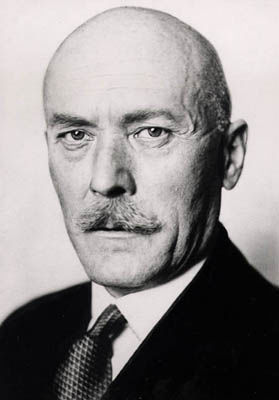On 18 January 1946, Gotthold Starke, Counsellor of the German Embassy in Moscow, carried out the last wishes of the former German Ambassador in Moscow, Friedrich-Werner Graf von der Schulenburg.
Throughout his diplomatic tenure, from 1934-41, Schulenburg advocated a rapprochement between Germany and the USSR. After his involvement in a conspiracy against Hitler and a failed assassination attempt on 20 July 1944, Schulenburg expected his imminent death.
Shortly before his arrest on suspicion of treason, Schulenburg asked Starke to deliver a message to Vyacheslav Molotov, people's commissar for foreign affairs of the USSR:
"Please inform Mr Molotov that I died for the cause to which I had devoted my life in Moscow, that is, for Soviet-German co-operation. The gravest hour for me was that early morning of 22 June 1941, when, according to orders, I delivered to Mr Molotov the mad declaration of war, only hours after we had spoken together about the last possibilities of averting a great catastrophe. In the course of the war, my opinion of Adolf Hitler's perilous foreign policy, which ‘culminated’ in the outbreak of war with the Soviet Union, was fully confirmed.
Therefore, I told a gentleman in the circle of the conspirators led by Dr Goerdeler of my views on the necessity for peace, in other words, for immediate contact with the Soviet Union, and I offered myself as a mediator during the first negotiations with the Red Army.
The failure of the coup, and thus the impossibility of fulfilling my mission, is not my fault as much as the role I was forced to play on 22 June 1941. In the last days of April 1941, I warned Adolf Hitler while in Berlin and reached in my conversation with him the limits of an imperial official's capacity. I have now sacrificed my life for my core political convictions.
(…)
The fact of my death in the name of cooperation between the Soviet and German peoples entitles me nevertheless to appeal to the leadership of Soviet foreign policy with a plea for wisdom and tolerance towards the German people, because its broadest strata, and not least those of the intellectuals, have denounced the folly of the war against the Soviet Union.
The well-being of the two great powers is closely linked to the sense of freedom and personal welfare of their peoples".
(Translated from Russian, source material in German)
On 19 October 1944, Schulenburg was arrested. He was executed at Plötzensee Prison on 10 November 1944.
Sources:
Testimony by Gotthold Starke, Counsellor in the German Embassy in Moscow, on Schulenburg's “Political Will”. 18 January 1946 // Central Archive of the Federal Security Service of the Russian Federation
Frontline Moscow 1941-1942: Archival Documents and Materials.
























